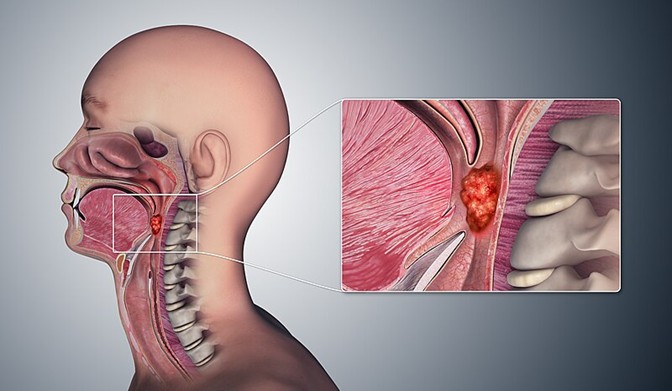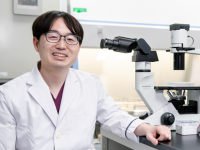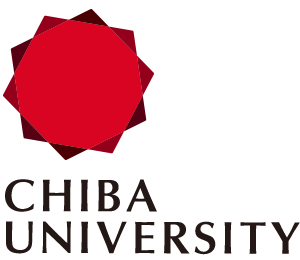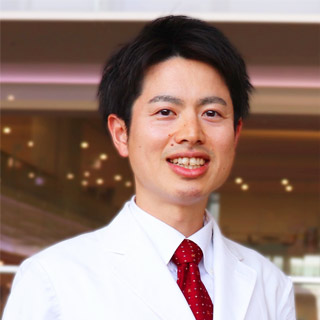Hybrid ecDNA drives HPV oncogene expression via novel enhancers and is a promising therapeutic target in HPV-mediated cancer
The incidence of Human Papillomavirus (HPV)-associated oropharyngeal cancer tumors of the back of the mouth and throat is rising. If caught early, most of these cancers have a high survival rate, but about 20% of patients have a poor prognosis. Now, researchers from UC San Diego and their colleagues have found that HPV DNA hybridizes with human DNA genes in oropharyngeal cancer cells, forming extrachromosomal circular DNA (ecDNA) that promotes tumor growth.

Image title: Oropharyngeal Cancer
Image caption: 3D medical animation illustrating the development of cancer in the tissues of the oropharyngeal
Image credit: Blausen Medical Communications, Inc. on Wikimedia Commons
Image link: https://commons.wikimedia.org/wiki/File:Oropharyngeal_Cancer.jpg
Image license: CC-BY-SA-4.0
Usage Restrictions: You are free to use, share, and modify the image under the CC BY-SA 4.0 conditions
EcDNA is made up of small, circular segments of DNA that form outside of chromosomes within the cell, and is frequently found in cancer cells. It has been shown to elude the immune system and drive carcinogenesis. Previous studies have demonstrated that ecDNA formed by the integration of HPV genes and human DNA is present in about 30% of HPV-positive oropharyngeal cancers. The study objective was to understand the molecular mechanisms by which hybrid ecDNA drives oropharyngeal cancer development.
The researchers analyzed changes to gene expression in ecDNA formed by HPV and human DNA hybridization in oropharyngeal tumor cells. The study discovered that:
- Previously unidentified HPV and human DNA enhancers increased the expression of tumor-promoting genes in cancer cells, leading to the production of more of the virus and increasing tumor growth.
- Targeting these enhancers with CRISPR gene editing technology and with proteins that regulate gene activity reduced their expression and inhibited growth in HPV-positive oropharyngeal tumors.
The research holds promise for the treatment of HPV-positive oropharyngeal cancers in patients who have received a poor prognosis, according to first author Takuya Nakagawa, formerly a postdoctoral researcher at UC San Diego School of Medicine, now an assistant professor in the Department of Otolaryngology Head and Neck Surgery at Chiba University Hospital and Health and Disease Omics Center at Chiba University in Japan. Selectively targeting tumors with ecDNA-disrupting therapeutics could slow their growth while leaving normal cells intact.
“There are now multiple types of drugs that are being developed both in the laboratory and in clinical trials to specifically target cancers that rely on ecDNA to grow,” said senior author Joseph Califano, MD, professor of otolaryngology at UC San Diego School of Medicine and director of the Gleiberman Head and Neck Cancer Center at UC San Diego Moores Cancer Center.
Califano lab is investigating which drugs work best to target ecDNA in general as well as hybrid ecDNA in particular. It is also studying other ways in which HPV virus-associated ecDNA can directly affect genes all over the human chromosome in addition to those encoded in ecDNA structures.
The study was published in Nature Communications on March 26, 2025.
About Dr Takuya Nakagawa
Dr Takuya Nakagawa is an assistant professor at the Graduate School of Medicine, Chiba University, Japan. He received his Doctor of Medicine degree in 2010. After completing his Ph.D. at Chiba University in 2019, he worked as a postdoctoral researcher at the University of California, San Diego (UCSD). In 2023, he joined the Chiba University Hospital as an Assistant Professor. He has over 10 years of experience in epigenomics, and human papillomavirus (HPV)-related cancers, with more than 20 publications.
Reference:
Title of original paper: Inhibition of human-HPV hybrid ecDNA enhancers reduces oncogene expression and tumor growth in oropharyngeal cancer.
Authors: Nakagawa T, Luebeck J, Zhu K, Lange JT, Sasik R, Phillips C, Sadat S, Javadzadeh S, Yang Q, Monther A, Fassardi S, Wang A, Pestonjamasp K, Rosenthal B, Fisch KM, Mischel P, Bafna V, Califano JA.
Journal: Nature Communications
DOI: 10.1038/s41467-025-57447-9
Media Contact:
Clara Bard
University of California San Diego Health Sciences
Cell: +1-202-441-8976
Email: scbard@ucsd.edu
Public Relations Office, Chiba University
Email: koho-press@chiba-u.jp
Recommend
-

Realizing the World’s Best Environmental Prediction Science Laboratory
2022.07.26
-

Nurturing Teaching Personnel for Multicultural Societies: High Schools-Universities-Graduate Schools’ Tripartite Collaboration to Develop Educational Programs in ASEAN Countries
2023.08.25
-

Fighting Back Against Japanese Cedar Pollinosis: Chiba University’s Sublingual Immunotherapy Takes the Lead
2023.05.30


